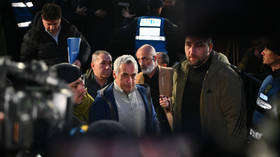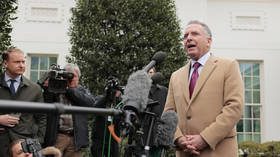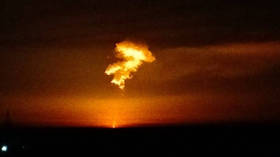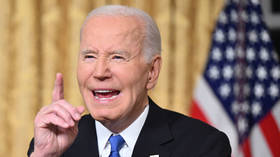‘Journalist’ Bilal Kareem, one-time Western media darling, emerges from Idlib prison with newfound critical view of jihadist pals
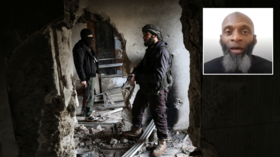
A US media personality and a prolific advocate for anti-government Islamist fighters in Syria now says the group he supported is torturing people in the city of Idlib and that he himself was abused while in custody.
Bilal Abdul Kareem is one of the more colorful figures in Syria’s protracted armed conflict. Once treated as a legitimate journalistic source by the mainstream media during the battle for eastern Aleppo, he fell into relative obscurity in the West after his close ties to jihadist forces were exposed.
This week, he gave an interview decrying the abuses of jihadist militants currently controlling Idlib, a city in northern Syria, accusing them of torturing prisoners. Now a fugitive, Kareem says he himself was abused while in their custody.
Also on rt.com ‘Like living in prison’: Refugees from jihadist-ruled Idlib share stories of oppressionThe interview published on Friday by the London-based Middle East Eye (MEE) depicts a grim picture of life in Idlib under the rule of Hay’at Tahrir al-Sham (HTS), the current predominant military force there. Kareem says the HTS leader, Abu Mohammad al-Julani, is “unfit to rule” and simply gaslighting the West when he claims that the civilian “Syrian Salvation” government is actually in charge. Al-Julani has been listed as a “Specially Designated Global Terrorist” by the US State Department, which has also placed a $10 million bounty on his head.
“I doubt that there’s one in a hundred people who could even tell you who the president of the Salvation Government is, because everyone knows that he wields no power,” Kareem said. The purported government is led by a prime minister, with the office currently held by Ali Keda, a former security official in an Islamist alliance.
Also on rt.com 2 journalists on ‘kill list’ sue Trump & US agenciesKareem added that torture is rife in prisons controlled by HTS and that he personally was repeatedly threatened with physical violence after being arrested in August 2020. Other inmates were not so lucky, he said.
“Almost every day of every week, I had to listen to the screams of torture just a few meters away from me. Everyone in the prisons can always hear the torture,” he told MEE.
Kareem was released in February and says he is now outside the territory controlled by HTS, fearing retribution. He claims his arrest was prompted by criticism of HTS’ rule in Idlib, and particularly their use of torture, which he believes to be against Sharia law.
They came to power... and then they start doing things other than that which they said. They promised to bring Islamic rule. They didn’t do it. They promised to bring justice. They didn’t do it.
He added that HTS was justifying what it does to prisoners by claiming it’s not torture. He said he once told a jihadist official when debating the issue: “You’re starting to sound like the Americans: ‘We’re not calling it torture. We’re calling it enhanced interrogation techniques.’ Torture by any other name is still torture.”
The accusations are quite remarkable, coming from the lips of Kareem. For years, he remained a vocal supporter of some of the most brutal jihadist groups fighting against the Syrian government. One of his first long interviews was with Abu Firas al-Suri, a senior figure in Al-Nusra Front, who was later killed in a US airstrike in April 2016.
Also on rt.com How the British government secretly funded Syrian cartoons and comic books as anti-Assad propaganda aimed at childrenHTS was formed in January 2017 through a merger of several jihadist groups, including Al-Nusra, whose founder and leader is the current head of the organization.
While platforming Islamist clerics, jihadist commanders and Islamic foot soldiers, Kareem was treated with respect and adoration by many mainstream media outlets, which either ignored or downplayed the implications of his associations.
In 2016, he was among the people explaining to audiences on CNN and Al Jazeera how the civilian population of eastern Aleppo was facing imminent obliteration at the hands of the Syrian government, which at the time was about to retake it from Islamist fighters. Contrary to predictions that his reporting days were numbered, Kareem left the city with his jihadist friends, releasing a video of a masked fighter wearing what he claimed to be a suicide belt on his way out.
He helped CNN to produce its Peabody-award-winning documentary about the siege of the Iraqi city of Mosul. In 2014, he was invited as a guest speaker on a panel about the “future of jihadism” at the DC-based Brookings Institution, arguing that the country needs “an Islamic solution” to its problems.
Al-Nusra Front, a former Al-Qaeda affiliate, and its HTS partners, which Kareem backed with his coverage, have been implicated in various atrocities since the early years of the Syrian war.
Think your friends would be interested? Share this story!



